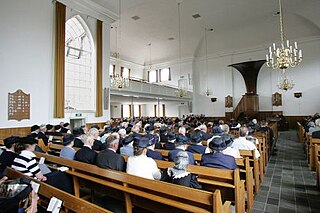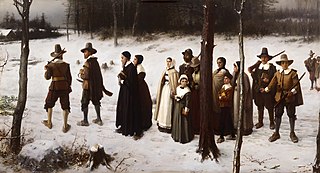Related Research Articles
Evangelicalism, also called evangelical Christianity or evangelical Protestantism, is a worldwide interdenominational movement within Protestant Christianity that puts primary emphasis on evangelization. The word evangelic comes from the Greek word for 'good news'. The Gospel story of the salvation from sin is considered "the good news". The process of personal conversion involves complete surrender to Jesus Christ. The conversion process is authoritatively guided by the Bible, the God in Christianity's revelation to humanity. Critics of the conceptualization of evangelicalism, argue that it is too broad, too diverse, or too ill-defined to be adequately seen as a movement or a single movement.
Fundamentalism is a tendency among certain groups and individuals that is characterized by the application of a strict literal interpretation to scriptures, dogmas, or ideologies, along with a strong belief in the importance of distinguishing one's ingroup and outgroup, which leads to an emphasis on some conception of "purity", and a desire to return to a previous ideal from which advocates believe members have strayed. The term is usually used in the context of religion to indicate an unwavering attachment to a set of irreducible beliefs.
Christian fundamentalism, also known as fundamental Christianity or fundamentalist Christianity, is a religious movement emphasizing biblical literalism. In its modern form, it began in the late 19th and early 20th centuries among British and American Protestants as a reaction to theological liberalism and cultural modernism. Fundamentalists argued that 19th-century modernist theologians had misunderstood or rejected certain doctrines, especially biblical inerrancy, which they considered the fundamentals of the Christian faith.
Jewish fundamentalism refers to fundamentalism in the context of Judaism. The term fundamentalism was originally used in reference to Christian fundamentalism, a Protestant movement which emphasizes a belief in biblical literalism. Today, it is commonly used in reference to movements that oppose modernist, liberal, and ecumenical tendencies within societies as well as modernist, liberal and ecumenical tendencies within specific religions and it is often coupled with extremist ideologies and/or political movements. The use of this definition is important in a Jewish context because the two movements which are most commonly associated with Jewish fundamentalism, Religious Zionism and Haredi Judaism, stray far from biblical literalism due to the importance of the Oral Law within Judaism. In fact, Karaism, the Jewish movement which is well-known due to its emphasis on biblical literalism, is rarely considered fundamentalist.
Dispensationalism is a theological framework for interpreting the Bible which maintains that history is divided into multiple ages called "dispensations" in which God interacts with his chosen people in different ways. It is often distinguished from covenant theology. These are two competing frameworks of Biblical theology that attempt to explain overall continuity in the Bible. Coining of the term "dispensationalism" has been attributed to Philip Mauro, a critic of the system's teachings, in his 1928 book The Gospel of the Kingdom.
Biblical inerrancy is the belief that the Bible "is without error or fault in all its teaching"; or, at least, that "Scripture in the original manuscripts does not affirm anything that is contrary to fact". Some equate inerrancy with biblical infallibility; others do not.
Liberal Christianity, also known as liberal theology and historically as Christian Modernism, is a movement that interprets Christian teaching by taking into consideration modern knowledge, science and ethics. It emphasizes the importance of reason and experience over doctrinal authority. Liberal Christians view their theology as an alternative to both atheistic rationalism and theologies based on traditional interpretations of external authority, such as the Bible or sacred tradition.
Biblical infallibility is the belief that what the Bible says regarding matters of faith and Christian practice is wholly useful and true. It is the "belief that the Bible is completely trustworthy as a guide to salvation and the life of faith and will not fail to accomplish its purpose."
Biblical literalism or biblicism is a term used differently by different authors concerning biblical interpretation. It can equate to the dictionary definition of literalism: "adherence to the exact letter or the literal sense", where literal means "in accordance with, involving, or being the primary or strict meaning of the word or words; not figurative or metaphorical".

Reformed fundamentalism arose in some conservative Presbyterian, Congregationalist, Reformed Anglican, Reformed Baptist, Non-denominational and other Reformed churches, which agree with the motives and aims of broader evangelical Protestant fundamentalism. The movement was historically defined by a repudiation of liberal and modernist theology, the publication (1905–1915) entitled, The Fundamentals, and had the intent to progress and revitalise evangelical Protestantism in predominantly English-speaking Protestant countries, as well as to reform separated churches according to the Bible, historic expression of faith and the principles of the Reformation. The Fundamentalist–Modernist controversy, and the Downgrade controversy, kindled the growth and development of reformed fundamentalism in the United States and the United Kingdom. Reformed fundamentalists have laid greater emphasis on historic confessions of faith, such as the Westminster Confession of Faith.
Conservative Christianity, also known as conservative theology, theological conservatism, traditional Christianity, or biblical orthodoxy is a grouping of overlapping and denominationally diverse theological movements within Christianity that seeks to retain the orthodox and long-standing traditions and beliefs of Christianity. It is contrasted with Liberal Christianity and Progressive Christianity, which are seen as heretical heterodoxies by theological conservatives. Conservative Christianity should not be mistaken as being necessarily synonymous with the political philosophy of conservatism, nor the Christian right.
Harold John Ockenga was a leading figure of mid-20th-century American Evangelicalism, part of the reform movement known as "Neo-Evangelicalism". A Congregational minister, Ockenga served for many years as pastor of Park Street Church in Boston, Massachusetts. He was also a prolific author on biblical, theological, and devotional topics. Ockenga helped to found the Fuller Theological Seminary and Gordon-Conwell Theological Seminary, as well as the National Association of Evangelicals (NAE).
Bibliolatry is the worship of a book, idolatrous homage to a book, or the deifying of a book. It is a form of idolatry. The sacred texts of some religions disallow icon worship, but over time the texts themselves are treated as sacred the way idols are, and believers may end up effectively worshipping the book. Bibliolatry extends claims of inerrancy—hence perfection—to the texts, precluding theological innovation, evolving development, or progress. Bibliolatry can lead to revivalism, disallows re-probation, and can lead to persecution of unpopular doctrines.

In Christianity, the term biblical authority refers to two complementary ideas:
Conservative evangelicalism is a term used in the United Kingdom to describe a theological movement found within evangelical Protestantism. Sometimes, the term is simply synonymous with evangelical within the United Kingdom. The term is used more often in the first sense, but conservative evangelicals themselves tend to use it in the second. Conservative evangelicals are sometimes called fundamentalists, but typically reject that label and are keen to maintain their distinct identity, which is more Reformed. Reformed fundamentalism shares many of the characteristics of conservative evangelicalism. In this sense, conservative evangelicalism can be thought of as distinct from liberal evangelicalism, open evangelicalism, and charismatic evangelicalism. Some conservative evangelical groups oppose women ministers or women preachers in mixed congregations.

Protestantism is the largest grouping of Christians in the United States, with its combined denominations collectively comprising about 43% of the country's population in 2019. Other estimates suggest that 48.5% of the U.S. population is Protestant. Simultaneously, this corresponds to around 20% of the world's total Protestant population. The U.S. contains the largest Protestant population of any country in the world. Baptists comprise about one-third of American Protestants. The Southern Baptist Convention is the largest single Protestant denomination in the U.S., comprising one-tenth of American Protestants. Twelve of the original Thirteen Colonies were Protestant, with only Maryland having a sizable Catholic population due to Lord Baltimore's religious tolerance.

In the United States, evangelicalism is a movement among Protestant Christians who believe in the necessity of being born again, emphasize the importance of evangelism, and affirm traditional Protestant teachings on the authority as well as the historicity of the Bible. Comprising nearly a quarter of the U.S. population, evangelicals are a diverse group drawn from a variety of denominational backgrounds, including Baptist, Lutheran, Mennonite, Methodist, Pentecostal, Plymouth Brethren, Quaker, Reformed and nondenominational churches.

Ecclesiastical separatism is the withdrawal of people and churches from Christian denominations, usually to form new denominations.
Wilbur Moorehead Smith (1894–1976) was an American theologian and one of the founding members of Fuller Theological Seminary.
Jia Yuming was a Chinese Christian theologian and biblical commentator. He worked at several seminaries and eventually became a vice-chairperson of the Communist Party-aligned Three-Self Patriotic Movement. He self-identified as a fundamentalist and taught that "perfect salvation", which in his definition entailed becoming a "Christ-human", was the ultimate goal of all Christians.
References
- ↑ "Who is a Bible Believer?". Real Bible Believers. Retrieved 2021-04-18.
- ↑ Hill, Craig C. (2002). In God's Time: The Bible and the Future, p. 12. Michigan: Wm. B. Eerdmans Publishing. ISBN 0-8028-6090-7